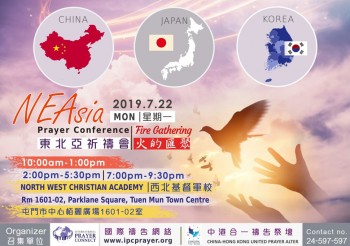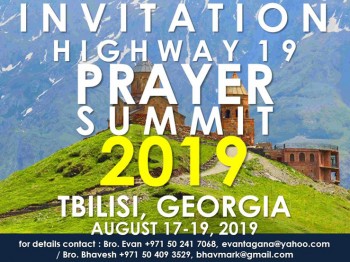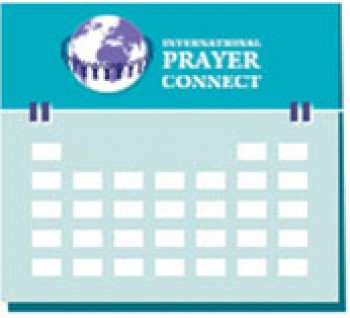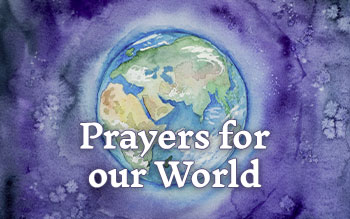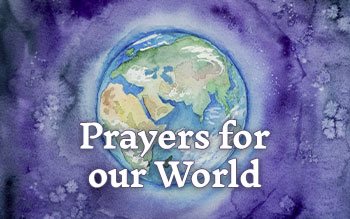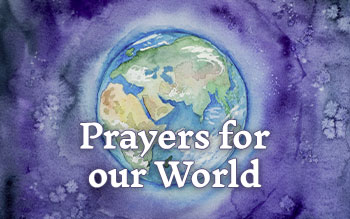
Super User
Lorem ipsum dolor sit amet, consectetur adipisicing elit, sed do eiusmod tempor incididunt ut labore et dolore magna aliqua. Ut enim ad minim veniam, quis nostrud exercitation ullamco laboris nisi ut aliquip ex ea commodo consequat. Duis aute irure dolor in reprehenderit in voluptate velit esse cillum dolore eu fugiat nulla pariatur
Global Outreach Day, is a global missions network that calls the church worldwide to focus on praying and sharing the gospel with the unchurched in the Month of May each year! This next year, May 2020, the vision is to mobilize a hundred million people in united prayer for the global harvest!
Watch the video here:
4 minute full version: https://vimeo.com/342384375
60 second short version: https://vimeo.com/344032191
 We are calling this initiative Go2020! Already Christians in 250,000 churches and 140 nations are part of this global outreach strategy to pray and witness towards the fulfillment of God’s Great Commission. This is not just for the adults, we want to invite the Children and the Youth to be full partners in this initiative! We want to call every One to be a praying, witnessing disciple for Christ!
We are calling this initiative Go2020! Already Christians in 250,000 churches and 140 nations are part of this global outreach strategy to pray and witness towards the fulfillment of God’s Great Commission. This is not just for the adults, we want to invite the Children and the Youth to be full partners in this initiative! We want to call every One to be a praying, witnessing disciple for Christ!
At the Lausanne International Congress on World Evangelization in 1974, Billy Graham made the mission clear, “The whole church must be mobilized to bring the whole Gospel to the whole world. This is our calling!” GO2020 could be the catalyst for the fulfillment of this in our lifetime as believers from every nation unify in the clarion call of "Every Believer a Witness". Imagine ONE Church sharing ONE Message during ONE Month, May 2020.
And we know this will only happen through United Prayer! God releases his power through the prayers of his people! As Dick Eastman says, “The degree to which prayer is mobilized is the degree to which the world will be evangelized!”
 Would you be 1 of 100 million in united prayer? Could you commit to Pray Now and share your faith with 5 others in your circle of influence who don’t know Christ through the month of May?
Would you be 1 of 100 million in united prayer? Could you commit to Pray Now and share your faith with 5 others in your circle of influence who don’t know Christ through the month of May?
We have listed 5 opportunities to begin praying now through the Month of May 2020. The Lord may lead you to commit to just one of these or all five. Pray and ask the Lord how he wants you to be involved!
#1 PRAY FOR FIVE
Our first strategy is to call each one of us to people in our circle of influence (neighbors, co-workers, friends, family members). We want to Pray daily for these people and for opportunities to reach them for Christ’s love.
#2 PRAYER TRIPLETS
Pray with two other believers weekly. Connect through Skype, Zoom, telephone, Facebook, or personally meet. Pray together for God’s Spirit to produce a global and local spiritual awakening and for the salvation of those on each person’s list who don’t know Christ.
#3 24/7 Prayer Mobilization
It is Jesus’ vision that every church in every nation be a house of prayer. It’s our aim to see united 24/7 prayer in cities, regions and nations leading to GO 2020. Help mobilize your city, region or nation to adopt a monthly day of prayer.
 Join with World Prays, a prayer network that asks that every church adopt a 12- or 24-hour time one day each month to pray. Members can pray for 30 or 60 minutes from anywhere--home, school, dormitory, workplace, church or with the people in their small group. Through doing so, churches develop a culture and regular rhythm of prayer while providing a prayer “covering” over geographic areas.
Join with World Prays, a prayer network that asks that every church adopt a 12- or 24-hour time one day each month to pray. Members can pray for 30 or 60 minutes from anywhere--home, school, dormitory, workplace, church or with the people in their small group. Through doing so, churches develop a culture and regular rhythm of prayer while providing a prayer “covering” over geographic areas.
Go to www.worldprays.org for more INFO or to sign up,
#4 Prayer for People Groups
Adopt an unreached people group for prayer and mission outreach. There are 4700 people groups on earth that have less than one believer per thousand people. They will remain unreached and cut off from Christ’s Gospel unless churches and prayer groups pave the way by adopting them for regular intercessory prayer. Focused prayer for the unreached is a strategy of the Lord of the Harvest to send laborers and prepare the hearts of these people who otherwise wouldn’t hear the gospel. Provided are resources to help you or your church find a people group to adopt or to guide how to pray for the least reached. You can sign up to adopt and unreached people group at this website! http://joshuaproject.net Also, see: https://inheritthenations.net/
#5 GO 2020 Prayer Gatherings - May 1, 2020
And finally, we want to call families, churches, cities and nations to gather on May 1st of 2020 in united prayer gatherings! Would you be willing to mobilize your church or your city to join in prayer with believers worldwide on May 1st in your region, asking God for a massive Christ awakening in the nations of the earth?
In the words of the Moravians call to action for both prayer and mission... “May the Lamb who was slain receive the due reward for his suffering.” -Rev. 5:12
Dr. Jason Hubbard
Tom Victor from The Great Commission Coalition and the IPC Leadership team shares our plans to mobilize children to be "Full Partners" in the Go 2020 Initiative.
Here's our "Simple Strategy" for Kids.
And as you read this, I encourage you to ask God if there are ways you can engage your kids, your grand kids, your neighbors, church or ministry. This could get exciting and you might just change a life - forever!
Go 2020 Kids "Simple Strategy"
1.Kids are invited to make a list of 5 others they want to reach through Go 2020
2.Kids pray over their list using the Prayer Covenant for Children Prayer Points
3.Kids ask God to help them share The Best News Ever with those on their list
4.When other kids (or adults) receive Jesus, kids begin a "Prayer Covenant" with them
5.Kids invite these new believers to make their own list of 5 they want to reach
6.Parents, grandparents, siblings, children's worker and others pray and encourage kids
During a mission conference in May in New York, I shared our "Simple Strategy" with Emma, taking her through the Prayer Covenant for Children and The Best News Ever.
 Emma - age 10
Emma - age 10
Emma is ten and she lives in Asia. When I asked Emma if she thought she could be a Go 2020 Kid, her eyes got big and she said, "Yes, I can do this!" The next day Emma came up to me and shared that she already had three of the five names on her list. She was so excited and kept coming up to talk with me every day.
At that NY conference I also shared with 77 kids about how they could be missionaries and share the Good News with other kids, taking them through The Best News Ever book.
Luke - age 7
 Afterwards Luke, age 7, who lives in New York, came up to me and said he wanted to be a Go 2020 Kid. His mother then shared this story. Luke's grandfather was paralyzed and about to be taken off life support in the hospital. But grandpa had not received God's gift of love in Jesus. Luke decided he needed to go to the hospital and read his Bible over his paralyzed grandfather. Then he began to "declare" God's word to his grandfather.
Afterwards Luke, age 7, who lives in New York, came up to me and said he wanted to be a Go 2020 Kid. His mother then shared this story. Luke's grandfather was paralyzed and about to be taken off life support in the hospital. But grandpa had not received God's gift of love in Jesus. Luke decided he needed to go to the hospital and read his Bible over his paralyzed grandfather. Then he began to "declare" God's word to his grandfather.
That's when a miracle took place. Luke's grandfather lifted up his paralyzed arms toward heaven, took his last breath and, we believe, entered heaven.
Luke believes God can work through kids - just like him!
Ruth - age 7
 My friend Chris heard the stories of Emma and Luke and decided to share about being a Go 2020 Kid with his daughter, Ruth, age 7.
My friend Chris heard the stories of Emma and Luke and decided to share about being a Go 2020 Kid with his daughter, Ruth, age 7.
They read The Best News Ever together. As she prayed the prayer in the book, Ruth said she felt God speak to her to apologize to hermother and brother for some bad behavior.
Jonathan, her brother age 3, then asked Ruth to read him The Best News Ever.
Chris shared how Ruth began not only to read to Jonathan, but, because of what she had just experienced with God, when she got tothe "hearing God" part of the book, she started teaching him, "Jonathan, you can pray and ACTUALLY hear God's voice!"
A powerful moment took place when Ruth got to the prayer page to surrender your life to Christ. Jonathan said, "I WANT to pray!" He then shot off the couch and went on his knees. Ruth led him in the prayer to receive Jesus word for word.
Scaling Up To Encourage Children - Everywhere
 Last week I was in Colorado with Rick and Becky Olmstead, our new 4 to 14 Window Movement leaders. Becky is the author of The Best News Ever. For three days we worked on plans to make her book available sothat50 million children around the world could become Go 2020 Kids.Imagine 50 million Emmas, Lukes and Ruths!
Last week I was in Colorado with Rick and Becky Olmstead, our new 4 to 14 Window Movement leaders. Becky is the author of The Best News Ever. For three days we worked on plans to make her book available sothat50 million children around the world could become Go 2020 Kids.Imagine 50 million Emmas, Lukes and Ruths!
Rick and Becky were about to go share at a Camp in California with children ages 4 to 11. As we talked about Go 2020 and their book, they decided to revise the end of their camp presentation. Becky would share The Best News Ever book with the children in different age groups.
As she did, of the 550 children attending the camp, 197 prayed to receive Christ for the first time! Wow!
 But here's even better news! All of the children were invited to pray and ask God who He wanted them to reach with The Best News Ever. They were told to write one or more names on a cup and bring it forward. Of the 550 children in attendance, 504 wrote one or more names on a cup. That's over a 91% response.
But here's even better news! All of the children were invited to pray and ask God who He wanted them to reach with The Best News Ever. They were told to write one or more names on a cup and bring it forward. Of the 550 children in attendance, 504 wrote one or more names on a cup. That's over a 91% response.
Here's one. . .
While this was happening in California, I was in Colorado Springs talking with ministry leaders about putting The Best News Ever in different formats (both digital and print) as well as languages. Some friends in the Philippines on the Go 2020 Kids journey couldn't wait.
They made photo copies (with permission) and included a page inviting the children to share The Best News Ever with other children.
 Meet Rachel from the Philippines. She's one of several who prayed to receive Jesus last week after hearing The Best News Ever. She wrote in her book the date of her "new birth" in Jesus.
Meet Rachel from the Philippines. She's one of several who prayed to receive Jesus last week after hearing The Best News Ever. She wrote in her book the date of her "new birth" in Jesus.
Friends,God is opening up amazing doors to mobilize the Go 2020 Kids vision. Several international and domestic trips are planned for the second half of this year. So many churches, ministries, denominations, networks and movements are engaging. But how about you?
Is there one child - or more, that you could empower to be a Go 2020 Kid? Maybe it's your own child or grandchild. Maybe it's someone in your neighborhood or your church. Why don't you pray about who you can "empower" to be "On Mission - With God!"
You might just change their life - forever! You might just change your own!
One Final Story:
Rachel in the Philippines accepted Jesus on June 21 as The Best News Ever was shared with her. Four days later she said these words over breakfast.
 "I'm Jesus' daughter. How about you, dad and mom?"
"I'm Jesus' daughter. How about you, dad and mom?"
They replied, "We are Jesus' children too."
Rachel said, "Me too. I had a spiritual birthday. I'm born again."
Mom said, "Wow! Yes. You were born again."
Rachel said, "Mom, how about a cake for my spiritual birthday? An angel cake?"
Mom says, "Who could say no to that!"
Final Comment:
We're working on the website to provide access to both the "Simple Strategy" and the "Tool Box" resources to mobilize Go 2020 Kids. But, if you are like our friends in the Philippines and you just can't wait to get started, send me a note and we'll do our best to help you "jump in now!"
Thanks for "dreaming God's dream" with us through your ongoing prayers and support.
Gratefully His and Yours,
Tom Victor – The Great Commission Coalition / IPC Leadership Team
More at www.go2020.world
51 Nations gathering – For Prayer, For Unity, For a Continent.
United Prayer Rising - Europe is a prayer and worship gathering happening this summer at Ashburnham Place in Sussex, UK bringing together people from all over Europe to contend for an awakening amongst the next generation. We believe God is raising up an army of passionate worshippers who will pray together to see their continent saved. This is God’s time for Europe!
UPRising Europe is part of the global UPRising movement birthed out of the World Prayer Assembly in 2012 in Indonesia. The first UPRising event was held in Seoul, South Korea in July 2016. Since then, there have been UPRising events in the Philippines, South Africa, Mongolia, Bolivia, Malaysia, Canada, Chile and Jakarta, Indonesia.
We are excited to now host an Uprising event for the continent of Europe. This is such a critical time for the continent – much is being shaken whilst God is stirring the hearts of young people for radical prayer and mission.
The backbone of UPRising Europe will be 72 hours of non-stop worship and prayer led by worship teams from all over Europe. These are the grassroots, passionate worship and prayer leaders who are faithful to where God has placed them and willing to contend for Europe.
Out of this will flow prayer and intercession for Europe, with inspiration from speakers in our main sessions. We will be hosting practical seminars equipping young people in a lifestyle of prayer, fasting and evangelism. Finally, we will be commissioning people to take this fire back to their nations.
Uprising Europe will be from the 8th to 11th July 2019 at Ashburnham Place, Battle, East Sussex. We want to invite anyone with a heart for Europe and the next generation to come and join us. Ashburnham Place, a retreat and conference centre, is set in beautiful grounds with lakes and woodlands. You can come and camp, or stay in the main house.
JJ Waters, Director of UPRising Europe said, “Following God’s lead, we are incredibly excited to gather together people from every nation in Europe to contend for an awakening amongst the next generation. This is such a critical time for Europe – God is moving powerfully but we know there is so much more to come. He is stirring the hearts of young people for radical prayer and missions, in what is now one of the most unreached continents on earth. Now is the time to come together from different nations, across denominations, honouring fathers and mothers, and to worship and pray for a mighty move of God in Europe.”
The ticket price for this event is generously subsided to make it affordable for delegates from across the continent. The UPRising Europe team would welcome offers of sponsorship from Churches, organisations and individuals who would like to sow into this event, for Europe.
Further details about the event, tickets, pricing or sponsorship can be found on our website https://www.uprisingeurope.org/ or please email us at This email address is being protected from spambots. You need JavaScript enabled to view it..
Uprising Europe is working with partners including YWAM, Burn 24-7, the World Prayer Centre, Ashburnham Place, Elim Prayer, Maranatha, Crosswinds Prayer Trust and Interprayer UK. Overseeing, supporting and endorsing the United Prayer Rising Europe event are Ian Cole of the World Prayer Centre, Birmingham, UK and Brian Mills of Interprayer, UK. They are both respected elders of the movement for prayer in the UK and worldwide.
We are excited to announce the North East Asia Prayer Council gathering in Hong Kong, July 22nd, with Gloria Au Yeung and her amazing team.
We would be honoured to have friends of IPC from around the world to join us and also if you could help us get the word out to invite key prayer leaders that you know from Korea, Japan, Hong Kong/China, and Mongolia.
People that attend are also encouraged to stay with us for the Oneness Gathering with David Demian and his team from China, July 24-27th.
My heart for this is to see a true spirit of John 17 unity and oneness grow between these beautiful nations and prayer movements.
Dr Jason Hubbard - Executive Coordinator
International Prayer Connect
In this season, we have seen the Lord highlighting our Chinese brothers and sisters in Christ – not only in Asia, but across the Globe, and not only for their own breakthrough, but also for the sake of the Global Body.
This July there will be another “Chinese Homecoming Gathering” in Hong Kong, where several thousand Chinese believers (from China, throughout Asia and beyond) along with other Global Family members in Christ will gather together to worship, pray and seek God’s face for the sake of seeing His Kingdom come and His will being done, on earth as it is heaven (Matthew 6:10).
At this time, the Lord is particularly highlighting the need for the kind of ‘oneness’ within the Body that Jesus prays about in John 17:21-23. We are responding to His longing for us to be ‘one’ as He and the Father are ‘one’ so that the world will know that He was sent by the Father.
This is a personal invitation to all those connected with IPC, as well as all family and friends, to join your Global Family for this “Chinese Homecoming Gathering: Oneness” July 24-27, 2019 in Hong Kong. And, whether you can or cannot join us physically, we encourage you to join us through prayer for this very significant time.
Prayer points:
- As God is doing a deep, exciting thing, the enemy has been working overtime trying to irritate the Chinese Family and create hostility in their hearts against each other. Please pray that the body of Christ will transcend the political spirit and continue to declare "We are one," in the spirit, so that the secular world can see the Way, the Truth and the Light through His Body.
- Pray that the Lord will protect the fruits of unity within the Chinese Body of Christ and that the church would be able to overcome the disturbances of the political spirit.
- Pray for safe travel of attendants from their countries to Hong Kong. *Especially pray for favor in getting visas for those from “restricted” countries* – as they will be the majority.
- Pray for the financial provisions for the "Oneness" Chinese Gathering.
- Pray for the Hong Kong administration team and that there will be plenty of volunteers. Pray that they will all flow as a family working together in love, honor, and God's anointing. Bless the department leaders with strength, wisdom and health and also pray they will have the heart of the Father as they host and receive the nations coming.
- Pray for the worship family, including the prophetic dance team and the team of prophetic artists – that they will flow as one with constant sensitivity to the leading of the Holy Spirit, and that they will get lost in His Presence and be totally enveloped in His love and protection.
- Pray for travel mercy and physical adjustment for those travelling from overseas to Hong Kong.
Thank you for your invaluable prayer support!
Please note that this is an open Gathering and everyone is most welcome to attend! Details can be found at https://watchmen.org/upcoming/chinese2019
https://watchmen.org/upcoming/chinese2019
More info and book here:http://www.asiagathering.hk/
For several years, our team Highway 19 has been involved in holding Prayer Summits for the fruition of the Highway in Isaiah 19:23-25.
During these Prayer Summits, we have witnessed the power of the Holy Spirit transform nations, and were blessed along with the many people who participated in these events.
This year, the Highway 19 Prayer Summit will be held in Tbilisi, Georgia August 16-19, 2019 included.
Please join us in prayers for the powerful and moving of the Holy Spirit for anointing the speakers, the participants, and for the churches in Tbilisi, Georgia to be a blessing to the nation, and the countries around it in the region.
This also serves as an invitation to all prayer partners who are willing to join us.
Feel free to contact the reference below.
Bro. Evan - This email address is being protected from spambots. You need JavaScript enabled to view it.
More info and Registration Form:https://forms.gle/eDw2JxLFTz9bqoZ1A
School of Prayer for the Nations - 9 Jun - 6 July 2019
www.allnations.ac.uk/courses/short-courses/school-prayer-nations
United Prayer Rising Europe – 8-11 July 2019
North East Asia Prayer Conference – 22 July 2019
Chinese Homecoming Gathering: Hong Kong – 24-27 July 2019
March for Jesus: Munich – 28 July 2019
www.europeablaze.tv
Highway 19 Prayer Summit: Tbilisi Georgia – 16-19 August 2019
https://forms.gle/eDw2JxLFTz9bqoZ1A
South East Asia Prayer Council Conference – 8-11 October 2019
https://www.seaprayer2019singapore.org/
Go 2020 Prayer Gatherings - 1stMay 2020
One God - One Day - One Africa – 31st May 2020
God has awakened His Bride in Australia. Even the pundits are calling Christian Prime Minister Scott Morrison's re-election a miracle. Mr. Morrison himself called it a "miracle" given the polls against him.
The Living God answered many prayers!
The Godly roots planted in that unique nation will still require constant prayer, fasting and repentance, but an awakening has happened that can now inspire Christians in other nations. The centuries old prophecy for that nation to be a light to others, as the Great Southland of the Holy Spirit, has been strengthened.
Warwick Marsh, leader of Australia's National Day of Prayer - a dear friend of mine, standing each year for our National Day of Repentance - called for 21 Days of Prayer and Fasting nationwide for the 2019 federal elections. After the victory Warwick said:
'Scott Morrison is not the answer for Australia. Jesus is the answer. The fact that Scott Morrison is our continuing re-elected Prime Minister only means we have three years to see Revival and transformation come to our nation without overt persecution. God has given us a window of opportunity....we need to keep on praying for the salvation of souls and renewal in the church... it is very humbling indeed and a great privilege to be part of true Christ centric national Christian unified prayer and fasting that results in a miracle victory. Having said that, the victory has come through the grace of God and through the blood of Jesus. 'Not of works lest any man boast.' This victory is a victory for God and God alone....Your prayers are shifting this nation towards righteousness.'
And Hilary Moroney-Egerson, key intercessor/prayer warrior in Canberra's House of Prayer for All Nations, had this insight, including how repentance was stage one:
What a Glorious Victory - Look what God did! Let us Raise a Hallelujah!!!!
However my heart has been burdened today for the Get Up youth and many others standing against God's Truth & Righteousness, weeping that they will Repent before Almighty God and NOT Rage against Him - so that the spirit of death will not be able to take them out in suicide, drug overdoses, alcoholism.
Let us PRAY Today that just as the Charge at Beersheba was the beginning of the Victory, our prayers can continue, just as the strategic troops went to dismantle all the mines in the wells before they detonated. If they hadn't done this, all the troops and horses could well have died from lack of water -
Let us PRAY for a radical harvest of souls from this young generation - that they would hunger and thirst after Righteousness and Truth and seek after God and be found by Him Jer 29:11-13, to come to the revelation of HOPE in His Saving Grace alone, for them and our nation, and the preciousness of every human life......instead of struggling feeling lost, angry, betrayed.
Let us Raise a Hallelujah and lift those of the losing side before the Throne of Grace the God's Victory will be fully won - Be Blessed by these words below and let's keep on Praying & Worshipping our God and Praying for the New Governent Leaders
The Canberra Declaration/Warwick Marsh/Margaret Court evening zoom call 21 days has gone through 3 clear phases ...
- Repentance, travail, and a cry for forgiveness for the sins of Australia
- A militant powerful declaration that the Lord Reigns over Australia and the election
- A celebration of the Lord and a change of prayer tone to declare of the Gospel of Jesus and revival/transformation
-- this is God's endgame; not the election which is a temporary situation; but the Gospel being made clear to the nation
-- Recognising our sin, the need for repentance, and His grace and forgiveness through Jesus and the cross
My feeling is that similar things happened in all the prayer groups/initiatives to one level or another.
The evening zoom group started in unity and become very much one (i.e. same heart).
There have been thousands praying across Australia in this season, in fact this election has brought the largest united prayer effort ever in this nation.
The big deal now is how to continue this with a view to the ecclesia rising up to her fullness in Christ and seeing Australia come into a full awakening and national transformation!!
As part of this we must better engage the under 35 NextGen in prayer and spiritual leadership.
'For the LORD will not abandon His people, now will He forsake His inheritance. For judgment will again be righteous, and all the upright in heart will follow it.' Psalm 94: 14-15
Thanks to repentance, thanks to prayer and fasting, thanks to a call for nation-wide unity among Christians, God heard those cries and acted.
The southern Cross shines bright in Australia; His anchor still holds!
In Jesus' Holy Name,
Pastor Jeffrey Daly
Founder/Director
National Day of Repentance
More at: http://www.repentday.com
..Commits To NATO Membership
Ukraine's president said he is ready to negotiate with Russia to end the war in eastern Ukraine, but he also reaffirmed his country’s course toward NATO membership -- a move strongly opposed by Moscow.
Volodymyr Zelenskiy made the comments on June 4 during a visit to Brussels, where he met withtop European Union and NATO officials as part of his first foreign trip as president.
Fighting between government forces and Russia-backed separatists in eastern Ukraine has killed some 13,000 people since April 2014, shortly after Russia seized control of Ukraine's Crimean Peninsula.
Cease-fire deals announced as part of the Minsk accords in September 2014 and February 2015 have contributed to a decrease in fighting in the eastern provinces of Donetsk and Luhansk but have failed to hold.
"We are ready to hold negotiations with Russia [and] to implement the Minsk agreements. But first we must be capable to protect ourselves and get stronger economically, politically, and militarily," Zelenskiy said at a joint press conference with NATO Secretary-General Jens Stoltenberg at the alliance's headquarters.
Zelenskiy also said that Ukraine's "strategic course to achieve full-fledged membership in the EU and NATO" remained unchanged.
Moscow has made explicit its opposition to NATO’s further expansion, especially as regards to Ukraine and Georgia. Tbilisi is also seeking to become a member of the Western military alliance.
Calling Ukraine a "highly valued partner," Stoltenberg expressed NATO's support for the country’s sovereignty and territorial integrity, saying: "Allies do not, and will not, recognize Russia’s illegal annexation of Crimea."
The NATO chief also called on Ukraine to implement reforms on fighting corruption and strengthening the rule of law.
"These reforms are essential to ensure security and prosperity for all Ukrainians and to bring Ukraine closer to NATO," he said.
Zelenskiy is scheduled to attend a session of the NATO-Ukraine Commission later in the day. The commission is the key format for cooperation between Kyiv and NATO.
A comedian-actor with no political experience, Zelenskiy was inaugurated on May 20 after defeating incumbent Petro Poroshenko by a large margin.
In addition to the conflict in the east and Russia's occupation of Crimea, Ukraine faces entrenched corruption and major economic hurdles.
With reporting by Reuters, TASS, Interfax, and Rikard Jozwiak in Brussels
Pray: For peace and stability to be restored in this region.
Pray: For wisdom, strength and statesmanship for President Zelenskiy despite his lack of experience.
Pray: For an end to the aggression and threats being made directly and indirectly by Russia.
Pray: That efforts to tackle corruption in the Ukraine will succeed.
U.S. President Donald Trump says he is prepared to talk to Iran but that there was always a chance of U.S. military action against Tehran.
"So Iran is a place that was extremely hostile when I first came into office," Trump who is on a state visit to Britain, told ITV television on June 5. "They were a terrorist nation number one in the world at that time and probably maybe are today."
Asked if he thought military action might be needed, he said: "There's always a chance. Do I want to? No. I'd rather not. But there's always a chance."
He said, when asked, that he was prepared to talk to Iranian President Rohani: "Yeah of course. I would much rather talk."
Trump's comments come amid heightened tensions between Iran and the United States and its allies in the Persian Gulf.
Washington a year ago withdrew from a landmark 2015 nuclear agreement between world powers and Iran that curbed the country's nuclear program in exchange for relief from economic sanctions.
Trump argued that the terms on the accord were not tough enough to prevent Iran from developing nuclear weapons and did not address the country's missile program or its support for militants in the region.
Since then, Washington has re-imposed sanctions, stepped up its rhetoric, and beefed up its military presence in the Middle East, citing " imminent threats" from Iran.
Iran's Supreme Leader Ayatollah Ali Khamenei said on June 5 that Tehran would not be "deceived" by Trump’s offer of negotiations and would not give up its missile program.
"This political trick will not deceive Iranian officials and the Iranian nation," Khamenei said in a speech broadcast on Iranian television.
Pray: for an end to the escalating tensions.
Pray: that Iran does not develop nuclear capability and adheres to its previous agreement.
Pray: that peace prevails and for a negotiated resolution to the crisis to be achieved.



